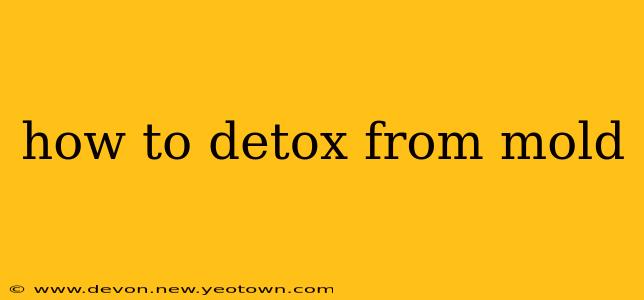How to Detox from Mold: A Journey to Recovery
Mold exposure can wreak havoc on your health, leaving you feeling unwell and struggling to pinpoint the cause. If you suspect mold toxicity, understanding how to detoxify your body is crucial. This isn't a quick fix; it's a journey requiring patience, persistence, and a holistic approach. This guide will walk you through the process, addressing common questions and concerns along the way.
What are the Symptoms of Mold Toxicity?
Mold exposure doesn't affect everyone the same way. Some people experience mild symptoms, while others suffer severe, debilitating effects. Common symptoms include:
- Respiratory issues: Coughing, wheezing, shortness of breath, sinus congestion, and asthma exacerbation.
- Neurological symptoms: Headaches, brain fog, difficulty concentrating, memory problems, and dizziness.
- Skin problems: Rashes, itching, hives, and eczema flare-ups.
- Gastrointestinal issues: Nausea, vomiting, diarrhea, and abdominal pain.
- Fatigue and weakness: Persistent tiredness and lack of energy.
If you experience any of these, consulting a doctor is crucial to rule out other potential causes and receive a proper diagnosis.
How Can I Detox from Mold?
Detoxing from mold isn't a one-size-fits-all solution. It requires a multi-pronged approach focusing on eliminating exposure, supporting your body's natural detoxification processes, and addressing underlying health issues.
1. Eliminate Mold Exposure:
This is the most critical step. If you're still living or working in a moldy environment, your body will constantly be re-exposed, hindering your recovery. This means:
- Testing your home: Conduct a thorough mold inspection to identify sources and extent of contamination.
- Mold remediation: Professionally remove mold from your home or workplace.
- Air purification: Utilize high-quality air purifiers with HEPA filters to remove mold spores from the air.
- Avoid moldy environments: Be mindful of where you spend your time, steering clear of damp basements, poorly maintained buildings, and areas with visible mold growth.
2. Support Your Body's Detoxification Systems:
Your liver and kidneys are the primary organs responsible for detoxification. Supporting their function is vital during a mold detox:
- Hydration: Drink plenty of clean, filtered water to help flush toxins from your system.
- Nutrition: Focus on a whole-foods, nutrient-dense diet rich in fruits, vegetables, and lean proteins.
- Fiber: Include plenty of fiber in your diet to support bowel regularity and toxin elimination.
- Liver support: Consider foods and supplements known to support liver health, such as milk thistle and cruciferous vegetables (broccoli, cauliflower). Always consult a doctor before starting any new supplements.
3. Address Underlying Health Issues:
Mold toxicity can exacerbate pre-existing health conditions. Addressing these is crucial for a successful detox:
- Gut health: Mold toxins can disrupt gut microbiota. Support gut health through a balanced diet, probiotics, and prebiotics.
- Immune support: A weakened immune system can make you more susceptible to mold's effects. Boost your immune system through healthy lifestyle choices and targeted supplements (again, consult a healthcare professional).
4. Consider Professional Support:
While self-care strategies are helpful, professional guidance can greatly benefit your recovery:
- Medical doctor: A doctor can help diagnose mold toxicity, rule out other conditions, and monitor your progress.
- Allergist/immunologist: These specialists can test for mold allergies and recommend appropriate treatments.
- Environmental medicine specialist: These doctors have expertise in the health impacts of environmental toxins, including mold.
What are Some Natural Remedies for Mold Detoxification?
Several natural remedies can support the body's natural detoxification processes. However, it's crucial to remember that these should be considered supportive measures and not a replacement for medical advice and treatment:
- Activated charcoal: It can bind to toxins, aiding their elimination.
- Chlorella: A type of algae purported to help remove heavy metals and other toxins from the body.
- Zeolites: Minerals claimed to support detoxification.
Always consult your healthcare provider before using any natural remedy.
Does Mold Detoxification Need Medical Supervision?
While some people may successfully detox from mold through lifestyle changes alone, others require medical supervision. If you're experiencing severe symptoms or if your symptoms don't improve after implementing self-care measures, seeking professional medical attention is essential. A doctor can help create a personalized treatment plan and monitor your progress.
How Long Does it Take to Detox from Mold?
The time it takes to detox from mold varies significantly based on factors like the severity of exposure, individual health status, and the effectiveness of implemented strategies. It can range from weeks to months or even longer in some cases. Patience and persistence are key.
Remember, healing from mold toxicity is a journey, not a race. Prioritizing your health, removing exposure sources, and supporting your body's natural detoxification systems are crucial steps towards recovery. Always consult with your doctor or a qualified healthcare professional for a proper diagnosis and personalized treatment plan. They can provide you with the best guidance to address your unique situation and ensure a safe and effective detoxification process.

